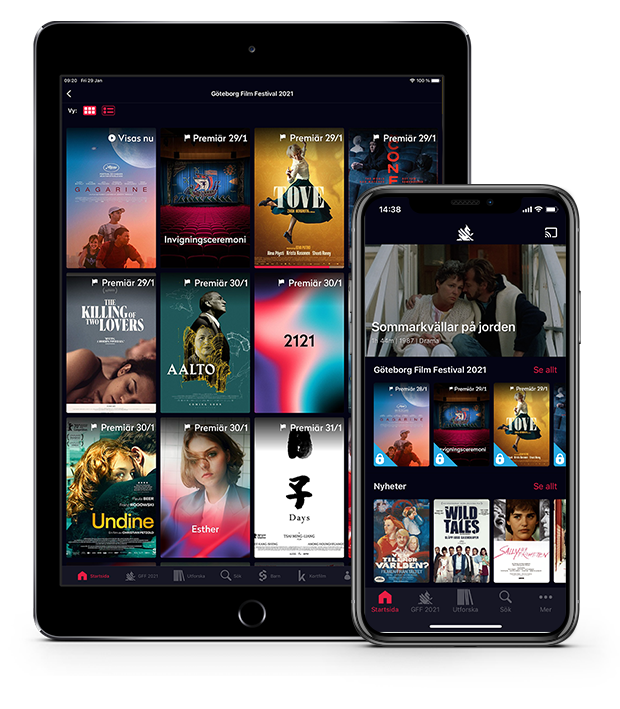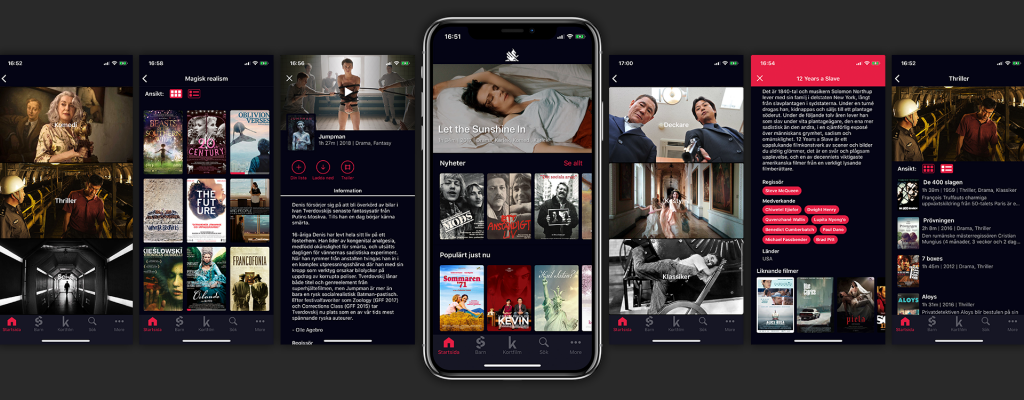Q&A: Draken Film’s, Olle Agebro on operating during a pandemic & the future of OTT streaming
We recently caught up with Olle Agebro, Head of Acquisition at Draken Film, to learn more about the origins of Draken Film, the impact of Covid-19, and Olle’s thoughts on current OTT industry trends. We also discuss recent projects, including revenue share with Swedish Independent Cinemas and bringing the annual Göteborg Film Festival’s experience online through Draken Film.

What’s the origin of Draken Film? And what did you set out to achieve at the beginning?
Our mission at Draken Film mirrors Göteborg Film Festival’s, which is to bring niche films to as large an audience as possible. The festival itself is based in Göteborg and takes place every year over the course of a week. When Draken Film was founded in 2014, it was to bring those films screened at the festival to wider audiences in Sweden and the Nordics year-round. The film festival is now in its 44th year, and I think Draken Film is one of the few places where really niche films can actually find an audience.
Over the last couple of years, how have you seen your OTT offering develop? Have you shifted your content strategy in any way?
When we started, we had the idea of bringing really niche films to a wider audience, and we really focused on that.
We also have our own film fund, where we support films that wouldn’t have a chance of being produced otherwise. And when Draken Film was launched, we had fewer film titles, but all were unique and couldn’t be found anywhere else.
Over the last couple of years, we realised that to bring even those films to a wider audience, we also needed to offer more commercial films alongside. So we now have mixed our catalogue with both niche titles and award-winning commercial films and have found a good balance.
Do you think delivering niche content can be a viable OTT business model?
It’s taken a while to grow our monthly subscribers, and we’re a small team, but today we’re profitable. I think you can be profitable with small subscriber numbers; it’s actually more about finding ways to make small teams and organisations work. The Magine Pro product is a really great example of that, and I’m surprised we haven’t seen more niche platforms as it can be a great business model.
COVID has been extraordinarily challenging for the industry. What are your insights and takeaways over the past year? And how did you react to the changes?
We’ve seen significant growth in subscriber numbers since January 2020. When the pandemic hit last March, we launched initiatives to support Swedish Independent Cinemas that had to either operate with much smaller audiences or close entirely. We offered new subscribers to Draken Film to pick a cinema they would like to support, and we shared revenue from those new subscribers with the cinemas. That initiative became quite successful, and it led to press and PR that helped increase our subscriber numbers last spring.
What was really important was that all those independent cinemas had a really great relationship with their own local audiences. When they communicated to them that they had to close but could recommend subscribing to Draken Film, that really built trust. The audiences trusted that Draken Film would serve the same purpose as their local cinemas and supported them.

Göteborg Film Festival on Draken Film
What impact has the pandemic had on the annual Göteborg Film Festival? How did COVID restrictions impact the planning and execution of the event?
Göteborg Film Festival is the largest film festival in the Nordics, and we typically have an audience of around 130,000 every year. We screen around 400 films at 20 cinemas in Göteborg. At the beginning of last year, we were scouting for films for this year’s festival (2021), but as more events and festivals cancelled, we realised we needed to plan for a hybrid or digital alternative. We set about trying to figure out a way to do a smaller physical event (700 seat cinema) that Draken Film supported with some digital screenings. However, as restrictions increased, we realised it would be tough to achieve, so we decided to bring the festival experience online through Draken Film entirely. That being said, we also screened every single film at the Draken cinema below our office for one person, so I guess it was a hybrid film festival. We also built a one-person cinema at a lighthouse in the Göteborg Archipelago, where a nurse was isolated for the entire week and watched all 70 films.
How much of a risk was it to pivot the festival from a traditional event to it being hosted digitally on Draken Film?
Yes, it was a risk. For a typical festival, we sell single tickets for each screening. Ticket sales are our most important revenue, and it happens for only one single week a year. So it’s essential for us, and when we risked selling those films in a package with a digital festival pass, we didn’t know what to expect. Fortunately, we sold more than we had anticipated, but we still had no idea how successful it would be – both the digital pass idea and the pricing. No one has sold a film festival in this way before, so it was a big risk.
What are your insights from working with the distributors on the digital film festival?
For distributors, it was actually quite risky to put their films on a digital platform. Many distributors were concerned they wouldn’t be able to get their films released in cinemas if they had already had their digital premiere. Typically a film premieres at cinemas for three or four months before it is released on VOD.
As we couldn’t offer a normal screening fee, we instead offered a revenue share where most distributors received a fee for every stream. This actually became quite interesting because some films suddenly had the potential to make money during a year when everyone’s expectations were zero.
We were also able to cap films with a 24-hour availability window, so every film had a fixed viewing time. A festival pass didn’t mean audiences were able to watch every film, whenever they wanted.
We had a few tough weeks of negotiating with distributors. Still, I think we ended up with a result everyone was quite happy with, both from the distributor and audience perspective.
We’re seeing a digital transition for cinemas and film festivals. Do you see this as a permanent shift or just temporary?
I believe it is a permanent shift. People will definitely go back to cinemas but will continue to stream more films at home than before.
Cinemas and film festivals that will be successful over the next couple of years will combine the digital experiences with the theatrical. And I think many cinemas could become better at programming films that respond to streaming trends rather than just following the release schedule set by distributors. I think if cinemas are smart, they can actually benefit from the increased interest in watching films at home.
Series/episodic content is beginning to take market share from movies when it comes to wider audience viewing. Do you think this trend will also take over the arthouse genre? And are we likely to see series content in the Draken Film service?
So I think that the arthouse community is a bit different from the general audience. And even though television series are popular, I think our audience appreciates that they have somewhere such as Draken Film focused solely on arthouse films.
But I believe there’s something about the episodic drama in that it’s really sticky and can make audiences stay around. I also think there are ways we and other film platforms can position and package content to make it stick in a very similar way. For example, audiences can get hooked on watching an entire category of South Korean thrillers in a similar way they would follow an entire season of Stranger Things.
Where do you see things moving for Draken Film in the next 12 months?
Since the film festival, distributors have realised that launching a film using a VOD platform can actually be beneficial to the theatrical release. I think more distributors will allow us to release films on day and date and do different TVOD (or versions of it) for their theatrical releases.
We will continue to test this and experiment to see if we can find a model where we share revenues with distributors and cinema. And also use Draken Film as a platform for other film festivals in future.
Our strategy is not to increase revenue but to find new areas for organic growth. After the film festival, we converted around 15% of the festival audience to Draken Film subscribers. And if we can do something similar with TVOD purchasers and other festival attendees, that’s an effective way to reach organic growth without investing in advertising.
What made you decide to switch Draken Film’s OTT platform provider to Magine Pro in 2018? And how has the platform enabled Draken Film to expand and evolve since then?
We had several reasons to change, and we understood from talking to our audience that it was necessary. We were also growing quite quickly, and we needed to have apps and support for more devices at the time.
We looked at different platform providers, and Magine Pro was the only one that delivered on compatibility with several platforms and offered us the possibility to launch apps on those platforms at quite a low cost. But the most important difference was that the Magine Pro model was based on user fee compared to a fixed fee.
The agreement we reached was very smart for the situation we were in back then, and it allowed us to scale quite quickly. It was a great fit.
We’ve been really happy with how the service has evolved and the new features you’ve launched and continue to add. I really hope in the future you’ll continue to deliver on that and keep developing the platform and apps in the way you have.
Most of our users can’t really differentiate the level of service between Draken Film and Netflix. Their experiences really are the same. And I think that’s quite exceptional for a platform the size of ours.
About Draken Film
Draken Film was founded in 2014 to serve as a digital film service for the annual Göteborg Film Festival. In 2018, Draken Film approached Magine Pro looking to change their OTT video platform provider, improve customer experience and quality as well as enhance their existing web-only streaming service and provide new high-quality apps on iOS and Android. Learn more about Draken Film and the project in our case study.
___________________________________________________________________________________________________
If you want to find out more about Magine Pro OTT solutions and services, get in touch! We can help you enhance your existing OTT service and/or launch something entirely new. You can also check out our experience and more of our case studies here, including Draken Film and the Göteborg Film Festival project.
Stay up-to-date with our latest releases, OTT platform updates and news on LinkedIn, or sign up for our e-newsletter and get them delivered straight to your inbox.
WHITE PAPER | Thematic Services: the future of OTT?
In our latest white paper, Thematic Services: the future of OTT? we explore the rise of thematic OTT services and discuss the opportunities and challenges they face.
The white paper features the results from Digital TV Europe’s Annual Industry survey 2020, where industry experts share their opinion on the relative appeal of specialist streaming, including what they think leads consumers to sign up to a subscription service, and how likely thematic services are to attract customers.
Independent analysis firm Omdia also share original research giving a unique consumer perspective on thematic OTT services, alongside forecasts on consumption and revenue share. We also look into how strategic marketing and technical agility can enable thematic OTT services to penetrate global markets and build a sustainable business. And María José Revaldería, Director General of FlixOlé provides an insight into the conception and growth of the Spanish Cinema streaming service. María also offers advice to others considering launching a thematic OTT service.
Register your details here to receive the white paper, Thematic Services: the future of OTT? in your inbox today.
To find out more about Magine Pro’s thematic OTT partners, including FlixOlé, PassionFlix and Docsville head to our experience page. You can find out more about our flexible OTT solutions and how we can help you build and launch a successful OTT business here.
Don’t forget to subscribe to the Magine Pro e-newsletter to stay up-to-date with our latest news, partners, products, and to find out which industry events we’ll be attending next. You can book in a meeting now on our events page; meet the team and demo our OTT services firsthand.
Q&A: Luke Boyle on streaming success
Ahead of the SportsPro OTT Summit last month, Magine Pro’s CCO, Luke Boyle sat down with SportsPro Media to offer his thoughts on streaming success.
In the Q&A, Luke discusses among other things the hurdles still to cross before digital overtakes linear distribution, and the lessons Sport can take from other genres in regards to commercialising OTT services. Luke also talks about the challenges of dealing with scale – a hot topic for fast-growing video services.
“Don’t overcomplicate the deliverables. The absolute essential for all OTT platforms is the quality of the stream, and ease to navigate to viewing experiences for the end-user.” – Luke Boyle.
Head over to the SportsPro Media website to read Luke’s Q&A on streaming success in full.
About Luke Boyle
Luke Boyle is the CCO of Magine Pro, which enables partners operating globally to build thriving OTT businesses with live and Video-On-Demand platforms. He is responsible for business development, marketing and account management functions.
Luke has over 25 years of experience in sports, holding senior roles at Sportcal, Sportbusiness, Civolution, Kantar and the Press Association. More recently, Luke has worked in the sports OTT sector, running business development activities for NeuLion (now Endeavor Streaming) in the EMEA and APAC regions.
________________________________________________________________________________________________________
If you missed the SportsPro OTT Summit in Madrid last week and would like to learn more about Magine Pro’s video services, and particular how we can help you build your own OTT business, get in touch. You can find out more about Magine Pro’s streaming success stories and our solutions here.
Don’t forget to subscribe to the Magine Pro newsletter to stay up-to-date with our latest news, products, and to find out which industry events we’ll be attending next. You can book in a meeting now on our events page, meet the team and demo our video services firsthand.

